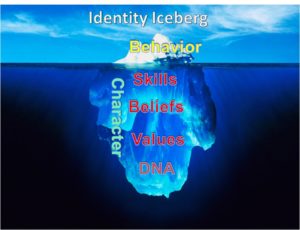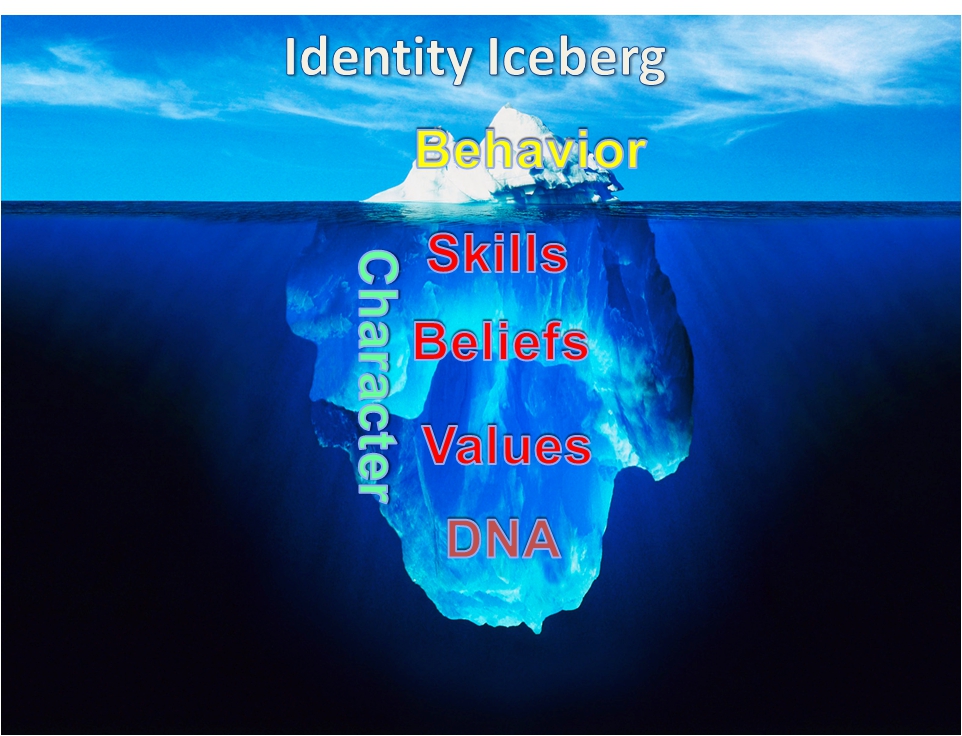How much effort will it take to change your Identity?
In the previous 9 blogs we discussed the Dimensions of Character; an eight dimensional structure that explains our thinking patterns. The concept of ‘Deserve Levels’ was explained as well. The relative rank you are willing to give you on each of the Dimensions of Self. We went over how Self Sabotage was the mechanism to keep people stuck at the lower level.
Let’s assume that you get it. That you went through the Triple8 Measurement system to find your Deserve levels. Let’s also say that you want to improve your deserve level at one or more of the eight Dimensions of Character. How do you do that? Where do you start? Can you even change your identity?
The Triple8 model for changing your ‘BE’: Identity Iceberg
Our behavior, the actions people can observe, are really like the tip of an iceberg. The thought patterns that made us act in that particular behavior, are the part of iceberg that is hidden below the waterline.

Identity Iceberg. We can see your behavior, but your character, how you are wired, is below the waterline.
To address the effort it takes of how to change the thought patterns that make up our identity, just follow this rule: the closer to the surface, the easier to change, the deeper we have to dive, the harder it will be to change the ingrained and over time shaped though patterns that make up your character, your attitude towards your health, and your responses to your environment.
Skills
Just below the waterline we find the skills that someone has acquired. It is simple, without certain skills you would never show certain behavior. For example, if you have learned to swim, you are much more willing to go in the water to swim. Therefore, the easiest way to start showing certain type of success behaviors is by learning new skills.
Of course, once you acquire a skill, your beliefs will change as well. When you learned to swim, and you crossed the pool for the first time, you probably build the belief that you can swim to the other side of the pool. After swimming many laps without resting, you developed the belief that you could swim across a pond of a certain size.
In fact, once you get good at a certain skill, there is the likelihood that you actually will like it, which is a change in values.
Beliefs
Below the level of skills we find ‘beliefs’. Beliefs are ‘the things you hold to be true’. You might hold true that ‘Money is the root of all evil’. If that is what you think, you will probably not be so successful in business.
Sandra held to the belief that money was evil. As she was a very independent woman, she had owned a string of businesses that always were hovering around that break-even point, or just below. After coaching her for a while I discovered this belief in the evilness of money. “Your belief is not biblical” I told her. “That text states that the lust for money is the root of evil. The moment money has no power over you, and you see it as a tool, the whole ethical question is about what it is you want to do with it. Having money itself has no ethical value. Your actions what you do with, and motivations to gather the money have.”
Once she accepted that, interestingly enough, her business took off.
So beliefs are ‘what we hold to be true’. This means, that some beliefs can be limiting, others can be liberating.
“If you believe I cannot help you, I indeed cannot help you.”
Beliefs can be changed though! You just need someone to believe in you. Have an event happen that shakes your beliefs. Or pick up the skill that will start to erode certain beliefs about what you can or cannot do.
“I always thought that selling something was a mysterious ‘gift’ that some people are born with, and other just don’t have. Until I got my first sales training that removed the mystery, and explained the psychological process that people go through when they buy something. That was it? Well, then I could learn how to sell. And I did…”
Values
Values are ‘what you hold to be important.’ They are deeper in our iceberg than beliefs, and are therefore harder to change. Let’s get a quick example between a belief and a value:
Do you belief you should obey the laws that the government has set? Probably yes. So, if that is the case, when was the last time you went over the speed limit? If you are like most people, you violate the speed limit very regularly, at least by a little.
Turns out that some laws are more important to you than others…
Values are truly a deeper part of our character set. We all probably believe that we should treat other people well. But how important it is to us, differs for each of us. Some believe only if there is a win – win, others believe that you must treat others well even if you have to take a hit.
Can our values change? Yes, although this is typically a process that takes much longer than changing a skill or a belief. For some extremely deep rooted, and degrading values, it can take years of therapy. However, the good news is, that in the field of business and success, there are many exercises that are designed to crease a certain experience to improve the liberating values of your self esteem, and others to let go of limiting values.
To get a bit more specific, some people have the value set that everything they do must be perfect. As a result, they take too much time to reach perfection. Once you give them certain exercises that make them realize that in many cases 20% of the effort can give 80% of the desired result, and that it is better to move to the next thing first before returning to reach a higher level of perfection, they get much better in letting go of the limiting value that they need perfection in everything before moving on.
DNA
At the deepest part of our iceberg we find the DNA part. The hard coded genetic part we are born with.
However, although it is hard to change, even that can be changed up to a point. Yes you are born with a given set of genes, but diet, sleep and exercise can switch some of them on or off. A simple example is Diabetes II. It is almost always related to a form of obesity. Loose the weight, get moving and eat healthy, and in many cases the Diabetes is almost gone, or at least gone dormant. Still, you might say that this is only about health, and not about the intellect you are born with…
Intellect
Did you know that you have several distinctly different forms of intellect? The ability to pick up certain skills, has besides the quality of your teacher, a lot to do with your genetic profile. But, what many people do not realize is that intellect can show in many different forms. There is the traditional intellect, when we think about the capability to do abstract reasoning and remembering of certain facts and that we express as IQ. But the ability to craft things with your hands is also a form of intellect, as is the capability of a formula 1 driver to hit the brakes while turning into the pit stop, from going 200 miles per hour, and stopping within an inch of the legs of his pit crew that is waiting while standing in an U-shape around the car. These formula 1 drivers will tell you that they ‘know’ exactly where the outside dimensions of their car are, and what their speed and angle of steering at any moment in time is. It is a form of spatial intelligence.
There are two take-away points from this. First off, don’t think you have a lower chance of success if you think your IQ isn’t as high as some of the academically schooled people around you. You are very likely to have a different form of intellect, maybe the capability to easily understand and communicate with people. Find what you are wired to do, and became real good at it is a very simple success principle. Then let others do the things you are not so good at.
Secondly, even if people are potentially wired to do better than you in a certain field, the winner is usually the one who kept going. Once you realize that you never stop learning, and you will continue to hone your skills, you will outperform the people that could have been much better at it. It is the principle behind the fable of the Turtle and the Hare…
Part of the Triple 8 Strategy for Success developed by Rene Hollebrandse, CEO and Business Coach with Mid-Atlantic Strategic Services. Email for more information.

